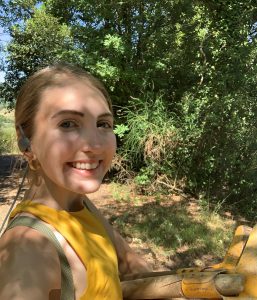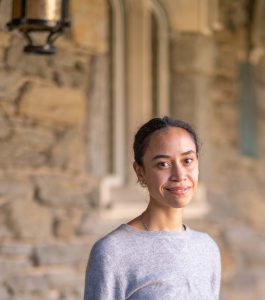About
The Digital Scholarship Graduate Fellows Program is offering an opportunity for graduate students to develop digital competencies, learn about the field of digital scholarship, and experiment with digital tools to support their research and teaching. Fellows are introduced to important digital scholarship skills and topics such as the command line, html/css, GitHub/markdown, project management, digital pedagogy, data management and metadata, GIS, digital archives and exhibitions, AI/machine learning, 3D and immersive digital scholarship, and more (see the syllabus on GitHub).
During the fall semester, fellows are supported by a stipend to participate in the seminar, develop skills in digital scholarship, and discover digital scholarship research in their fields. Each fellow will create a professional website, choose an area of specialization to develop, and present their work at the Digital Scholarship Research Fair. During the spring semester, fellows have the opportunity to be hired as a Digital Scholarship Graduate Assistants and continue to develop their skills by applying them to faculty and staff led digital scholarship projects, supporting digital scholarship in the classroom, creating and teaching workshops for undergraduate and graduate students, and a variety of other activities.
Applications for the 2026-2027 year will open in Spring 2026. For more information about how to apply, see last year’s call for applications. Please reach out to Alice McGrath with any questions about the program.
2025-2026 Fellows
Jennifer Rittenhouse (Physics)
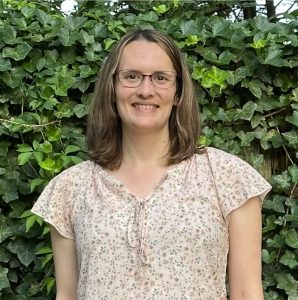 Jennifer Rittenhouse is a nontraditional student who earned her B.A. in Psychology in 2010 and worked with Children and Adults with special needs around south-central PA. In 2016 She made a major career change to study physics, working part time with before and after school children and earning her B.S. in Physics in 2023 from Millersville University. As an undergraduate, she fabricated and analyzed nanoscale thin films. As a second-year graduate student at Bryn Mawr College, she is continuing to study nanoscale materials related to spintronics and Quantum Information Science. In her free time, Jennifer enjoys playing piano, guitar, hiking, participating in group exercise classes and meditation.
Jennifer Rittenhouse is a nontraditional student who earned her B.A. in Psychology in 2010 and worked with Children and Adults with special needs around south-central PA. In 2016 She made a major career change to study physics, working part time with before and after school children and earning her B.S. in Physics in 2023 from Millersville University. As an undergraduate, she fabricated and analyzed nanoscale thin films. As a second-year graduate student at Bryn Mawr College, she is continuing to study nanoscale materials related to spintronics and Quantum Information Science. In her free time, Jennifer enjoys playing piano, guitar, hiking, participating in group exercise classes and meditation.Charlie Taylor (History of Art)
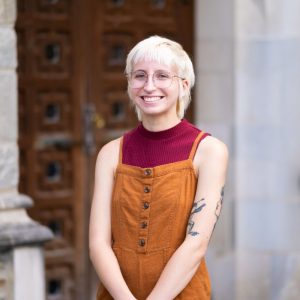 Charlie Taylor (they/she) is a PhD student in History of Art. Their research focuses on Byzantine and post-Byzantine icon painting, medieval image theory, and transculturalism in the medieval Mediterranean and Red Sea regions. They are particularly interested in mapping technologies and the ability of maps to demonstrate cultural exchange. Charlie has held internships at the Met Cloisters and the Associated Artists of Pittsburgh, as well as a TAship in digital humanities at the University of Pittsburgh.
Charlie Taylor (they/she) is a PhD student in History of Art. Their research focuses on Byzantine and post-Byzantine icon painting, medieval image theory, and transculturalism in the medieval Mediterranean and Red Sea regions. They are particularly interested in mapping technologies and the ability of maps to demonstrate cultural exchange. Charlie has held internships at the Met Cloisters and the Associated Artists of Pittsburgh, as well as a TAship in digital humanities at the University of Pittsburgh.Past fellows
2024-2025
Illizt Castillo (CNEA)
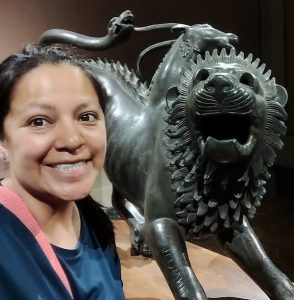 Illizt Castillo is a PhD student in the Classical and Near Eastern Archaeology department. She received a BA in English Language and Literature, a BA in Classics, and an MA in Comparative Literature from the National Autonomous University of Mexico (UNAM). In 2023, she received an MA in Archaeology from Bryn Mawr College. Her research interests focus on the transmission of manufacturing techniques and iconography of bronzes through networks of exchange between Etruscan and Italic peoples. As a digital scholarship fellow, Illizt is interested in 3D modelling, GIS, and the integration of Digital Humanities in pedagogy and the public engagement of Archaeology beyond museums.
Illizt Castillo is a PhD student in the Classical and Near Eastern Archaeology department. She received a BA in English Language and Literature, a BA in Classics, and an MA in Comparative Literature from the National Autonomous University of Mexico (UNAM). In 2023, she received an MA in Archaeology from Bryn Mawr College. Her research interests focus on the transmission of manufacturing techniques and iconography of bronzes through networks of exchange between Etruscan and Italic peoples. As a digital scholarship fellow, Illizt is interested in 3D modelling, GIS, and the integration of Digital Humanities in pedagogy and the public engagement of Archaeology beyond museums.Hilde Nelson (History of Art)
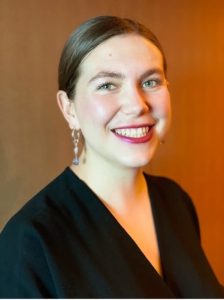 Hilde Nelson is a third-year graduate student in the History of Art department at Bryn Mawr. Her work considers questions of visuality and the otherwise in contemporary time-based media, especially film and video, as they are inflected by race, gender, and sexuality. She received her BA with honors in History from the University of Chicago in 2015 and her MA in the History of Art from the Williams College Graduate Program in 2017. She is the former Curatorial Assistant for Contemporary Art at the Dallas Museum of Art, where she curated Naudline Pierre: What Could Be Has Not Yet Appeared, the artist’s first solo museum exhibition. She has also held positions at Creative Time, Julius Caesar Gallery, and the Williams College Museum of Art. In conjunction with the Incubation initiative, she co-curated the group exhibitions reverb (2023) and Theories of Relativity (2024), both featuring the work of second-year Penn MFA students. Her writing has been published in the Visual Resources journal and in exhibition catalogues for What Could Be Has Not Yet Appeared—for which she also served as editor—and the 2022 exhibition Matthew Wong: The Realm of Appearances at the DMA.
Hilde Nelson is a third-year graduate student in the History of Art department at Bryn Mawr. Her work considers questions of visuality and the otherwise in contemporary time-based media, especially film and video, as they are inflected by race, gender, and sexuality. She received her BA with honors in History from the University of Chicago in 2015 and her MA in the History of Art from the Williams College Graduate Program in 2017. She is the former Curatorial Assistant for Contemporary Art at the Dallas Museum of Art, where she curated Naudline Pierre: What Could Be Has Not Yet Appeared, the artist’s first solo museum exhibition. She has also held positions at Creative Time, Julius Caesar Gallery, and the Williams College Museum of Art. In conjunction with the Incubation initiative, she co-curated the group exhibitions reverb (2023) and Theories of Relativity (2024), both featuring the work of second-year Penn MFA students. Her writing has been published in the Visual Resources journal and in exhibition catalogues for What Could Be Has Not Yet Appeared—for which she also served as editor—and the 2022 exhibition Matthew Wong: The Realm of Appearances at the DMA.Lala St. Fleur (CNEA)
Yuzhu Wang (History of Art)
 Yuzhu is a graduate student in the Department of History of Art, focusing on Medieval Chinese religious and funerary art. She holds a BA in Archaeology from Renmin University of China (2015) and an MA in Art History from Tufts University (2019). Yuzhu is interested in how digital tools like 3D scanning and digital replication can bring artistic objects and spaces to life in immersive, interactive formats. She is also passionate about using these technologies in teaching to create more engaging and dynamic learning experiences.
Yuzhu is a graduate student in the Department of History of Art, focusing on Medieval Chinese religious and funerary art. She holds a BA in Archaeology from Renmin University of China (2015) and an MA in Art History from Tufts University (2019). Yuzhu is interested in how digital tools like 3D scanning and digital replication can bring artistic objects and spaces to life in immersive, interactive formats. She is also passionate about using these technologies in teaching to create more engaging and dynamic learning experiences.2022-2023
Mallory received her B.A. in classical languages from John Carroll University in 2019, with a second major in Professional Writing. In 2022 she received her M.A. from Bryn Mawr College with a thesis entitled “Beyond Augustus as Aeneas: Parallels between Ascanius and Octavian in Vergil’s Aeneid.” As a classicist, she’s interested in using digital scholarship to further research in philology and literature through tools like the Classical Languages Toolkit. But after working with Bryn Mawr’s Special Collections on a number of projects, she remains deeply engaged with the material culture of the classics and also looks forward to building on previous experience with 3D printing and digital exhibitions. Digital scholarship is an exciting and important piece of the interdisciplinary approach that she favors.
Kari Fossum (CNEA)
Kari is a second-year graduate student in the Department of Classical and Near Eastern Archaeology. She received her B.A. in Classics from Mount Holyoke College in 2021. Her research interests include connectivity, mobility, and identity formation in Archaic Greece, Greek colonization, especially around the Black Sea and on its northern shore, and Greco-Scythian interaction. She is also interested in metallurgy and numismatics. As a Digital Scholarship Graduate Fellow, Kari hopes to explore archaeological applications for coding, especially using Python, as well as other digital tools, like GIS, that can facilitate archaeological research in areas where fieldwork is not possible.
Alexis White (History of Art)
2021-2022
Meg Hankel (History of Art)
Meg Hankel is a doctoral student in the history of art. She specializes in the history of photography, modern and contemporary art, and new media. She earned an MA degree in art history from the University of Georgia in 2017, and a BA in art history from Columbia College Chicago in 2009. Her dissertation research focuses on the stereograph and the use of 3D technologies (such as VR) in contemporary art practices. Other research interests include the intersection of art, gaming, and the theory of play, as well as the development of color technology in analog and digital photography.
Meriç Özölçer (History of Art)
Meriç is a third-year MA student focussing on Byzantine and Medieval Islamic Art & Architecture. She has a B.A. degree in Psychology from Boğaziçi University and an MSt in Late Antique and Byzantine Studies from University of Oxford. She is interested in how movement unfolds within architectural space and material environment, giving rise to the experience of ritual. As a digital scholarship fellow, she aims to learn about how these processes can be visualized.
Clare Rasmussen (Classical and Near Eastern Archaeology)
Clare Rasmussen is a Ph.D. candidate in the Department of Classical and Near Eastern Archaeology. Before coming to Bryn Mawr, she received her B.A. as a double major in Anthropology and Classical Archaeology from the University of Michigan (2015) and a M.A. in Classics from the University of Arizona (2017). She earned another M.A. in Classical and Near Eastern Archaeology from Bryn Mawr College (2020). Her research interests include aqueducts, hydraulic technology and infrastructure, Greek and Roman city planning, urban architecture, and cultural identity in the Roman provinces. She was attracted to Digital Scholarship as it intersects with her dissertation research on the socio-cultural aspects of water supply systems in Near Eastern Roman cities. She is eager to investigate ancient Roman water systems using ArgGIS and learn data visualization and management tools.
Tie Taylor (Graduate School of Social Work)
Tie Taylor is a first year graduate student in the Social Work program. They are on the clinical track. Although Tie’s background is in Elementary Education (M.S.Ed University of Pennslyvania), their interests are mainly guided by the urgent nature of social justice. Tie is inspired to research the intersections of mental illness, the disability justice framework, and access to life-changing and life-sustaining technology.

